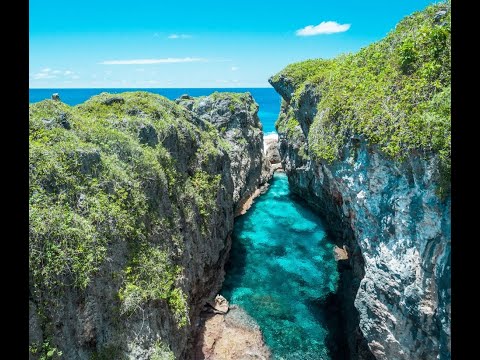
Nestled in the heart of the Pacific Ocean, Niue is a captivating island that offers a blend of natural beauty and intriguing culture. Often referred to as “The Rock” due to its limestone cliffs and rugged coastline, Niue stands as one of the world’s smallest independent nations. This article explores the unique aspects of Niue, from its geographical formation and cultural heritage to its modern-day attractions and conservation efforts.
### Geographical Marvel
Niue is located in the South Pacific Ocean, east of Tonga, and is one of the largest uplifted coral atolls on earth. This isolation contributes to its distinct landscape characterized by steep limestone cliffs and a central plateau. The island’s terrain supports a diverse range of ecosystems, making it a haven for nature lovers. The surrounding coral reefs are teeming with marine life, making snorkeling and diving some of the most popular activities for visitors.
### Cultural Richness
The population of Niue is predominantly Polynesian, and the local culture is deeply rooted in traditional values and practices. The Niuean language is widely spoken alongside English, which is used in government and business sectors. Villages on the island often gather for village feasts called “fakaaoga,” where traditional food such as uga (coconut crab) and taro are served.
Cultural events such as the “Niue Cultural Festival” provide an insight into local arts, crafts, and dances. These festivals are vital for preserving Niue’s cultural identity amidst globalization pressures.
### Economy and Sustainability
Niue’s economy is modest, with tourism being one of its main economic drivers. The government has been actively promoting eco-tourism to attract visitors while preserving its environmental integrity. Agriculture also plays a crucial role; however, frequent cyclones pose challenges to sustainable farming.
In terms of sustainability initiatives, Niue has made significant strides in marine conservation. The establishment of large marine protected areas ensures that biodiversity thrives around its waters—an essential step for maintaining fish populations not only for ecological balance but also for local fishermen reliant on these resources.
### Challenges and Resilience
Despite its enchanting charm, Niue faces several challenges such as limited natural resources and emigration which leads to a declining population currently around 1,600 residents. These issues raise concerns about labor shortages and economic sustainability.
However, resilience runs deep within the community; efforts to promote renewable energy usage have increased in recent years with substantial investment in solar power systems aimed at reducing reliance on imported diesel fuel for electricity generation.
### Connectivity with the World
While maintaining strong ties with New Zealand—with many Niueans holding New Zealand citizenship—the island remains largely autonomous under its own government system based on Westminster-style democracy.
To increase accessibility to this remote destination several flights per week connect Auckland with Hanan International Airport in Niue facilitating not only tourism but also providing locals with necessary goods imports including food items which can’t be grown locally due to soil limitations or climatic conditions unsuitable for farming certain crops like rice or wheat commonly consumed by locals changing dietary preferences influenced by global trends over time reflecting increasing globalization effects even here remote corners planet alike!
In conclusion: Exploring further into remote yet remarkable destinations such as should not only be seen adventure seeking travelers’ bucket list items but also opportunities learn about how small communities manage exist harmoniously within confines delicate ecosystems while facing modern-day challenges global society continues evolve around them understanding appreciation these little-known places contributes greater knowledge our shared world heritage increasingly interconnected planet Earth ever more relevant today’s context climate change environmental degradation other pressing issues face humanity 21st century onwards!
